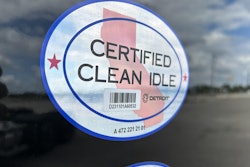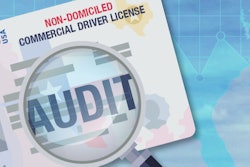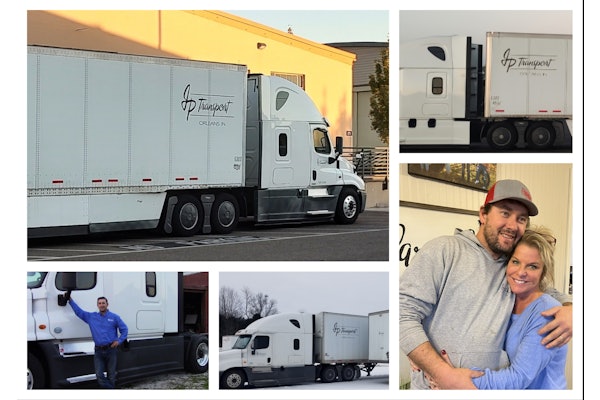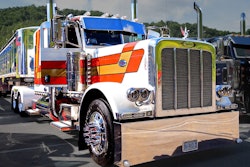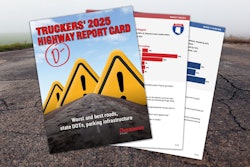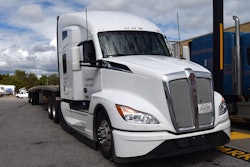President Donald Trump's executive order mandating all truck drivers in the U.S. speak English has quickly become official Federal Motor Carrier Safety Administration guidance to inspectors around the country, yet the most populous state in the U.S., California, still isn't enforcing it.
California Highway Patrol said it's not putting drivers out-of-service for not speaking English despite new federal guidance on the rule.
Some states may also delay implementation of the rule, as a review of violations data shows.
The Commercial Vehicle Safety Alliance, tasked with standardizing CMV inspections, explained how California's $30 million in federal grants may depend on adopting federal regulations.
As of June 25, the violation of the English requirement -- Code of Federal Regulations 391.11(b)(2) -- has returned to the Commercial Vehicle Safety Alliance's out-of-service criteria, which all states are supposed to consistently enforce.
With just more than a month since then, here's a look at which states recorded the most violations of the language-proficiency requirement, with federal data mined by Overdrive parent company Fusable's MC Advantage:
The top three states for ELP violations all have commercial zones along the Southern border with Mexico, where FMCSA guidance dictates inspectors should issue violations to Mexican operators if they can't speak English, but they "should not take follow-on actions of placing the driver out-of-service.”
Other, non-border states mostly have placed drivers OOS for ELP violations since June 25.
To illustrate this more closely, take a look at this county-level breakdown of ELP violations in the state of Texas. Every county that recorded mostly non-OOS ELP violations sits on the U.S.-Mexico border. Counties that recorded OOS ELP violations all sit in the state's interior, away from the border zone.

Now let's look at California. Two border counties, San Diego and Imperial, comprise the bulk of all ELP violations and the one OOS ELP violation. Otherwise, California inspectors have logged just one ELP violation away from the border zone in Kern county, and inspectors did not place that driver OOS.
Overdrive asked California Highway Patrol what happened with that one inspection in Kern and heard back that CHP does not in fact enforce ELP as an OOS violation.
CHP "has not implemented any enforcement changes in response to recent federal guidance requiring commercial drivers to speak English, as it is not part of California law," a spokesperson for CHP said.
What about the one OOS violation they did enforce, and the dozens of non-OOS violations at the border?
"Many United States Department of Transportation (USDOT) inspectors work at or near the border," the spokesperson continued. "The Federal Inspectors enforce federal regulations in California and are not regulated by the CHP."
DOT Secretary Sean Duffy might have referenced this difficulty in getting states to enforce the ELP mandate in a recent appearance before Congress.
Many, but not all.
CVSA maintains the North American Standard Inspection Program, a "collection of inspection procedures and criteria followed by CVSA-certified inspectors," according to CVSA Deputy Executive Director Adrienne Gildea.
California Highway Patrol CMV inspectors, as well as any state employee who issues a CVSA decal, would be a "CVSA-certified" inspector.
Gildea said its standard program "ensures consistent processes and procedures related to commercial motor vehicle enforcement in Canada, Mexico and the U.S.," but acknowledged that "regulations vary between the three countries and among the individual jurisdictions."
Typically, the big consequence for a state not complying with federal laws is a loss of funding through the Motor Carrier Safety Assistance Program (MCSAP). "In the U.S.," Gildea said, "states participating in the MCSAP program are required by FMCSA to adopt the Federal Motor Carrier Safety Regulations into their own state law/code, which is the law/code the state inspectors have authority to enforce as state personnel. However, it is not uncommon for some jurisdictions to have small variances from the federal requirements."
FMCSA reviews state programs, and if there are "variances," then FMCSA "determines if the difference is significant enough for the agency to deem the program noncompliant with MCSAP requirements," said Gildea.
In 2024, California received more than $30 million in contractual and supplemental federal grants through MCSAP, which funds the training of state law enforcement personnel. State police can only enforce state laws, however, hence a need for states to adopt federal regulations in state code.
"Any changes to federal regulation must be adopted by the state through their own administrative process," Gildea said. "This process can vary from state to state -- some adopt automatically by reference to the federal regulations while others require a legislative session."
Overdrive reached out to the Pennsylvania State Police as well, as inspection data showed 44 ELP violations recorded in the June 25-July 20 time period, with only five resulting in a driver OOS. State Police said that, "anytime there is a modification to any Federal statute, regulation, standard, or criteria that Pennsylvania has adopted, the modification cannot be applied in Pennsylvania until 60 days after the federal effective date."
So it will take until August 25 until PSP starts enforcing ELP as an OOS violation.
Gildea said CVSA recognizes that states like Pennsylvania and California can't enforce laws not on their books, and that the CVSA's standard inspection program and the OOS criteria "both include language requiring CVSA members to enforce the OOSC in line with the North American Standard Inspection Program, except where 'state, provincial, territorial or federal laws preclude enforcement of a named item.'"
As for whether California crosses the line between simple variance or outright non-enforcement, CVSA did not comment on that.






